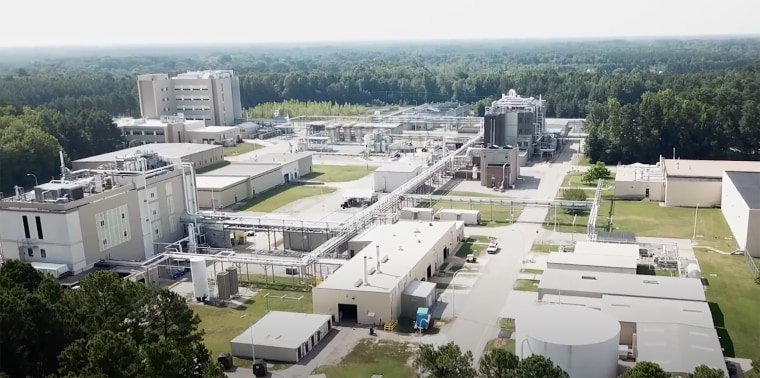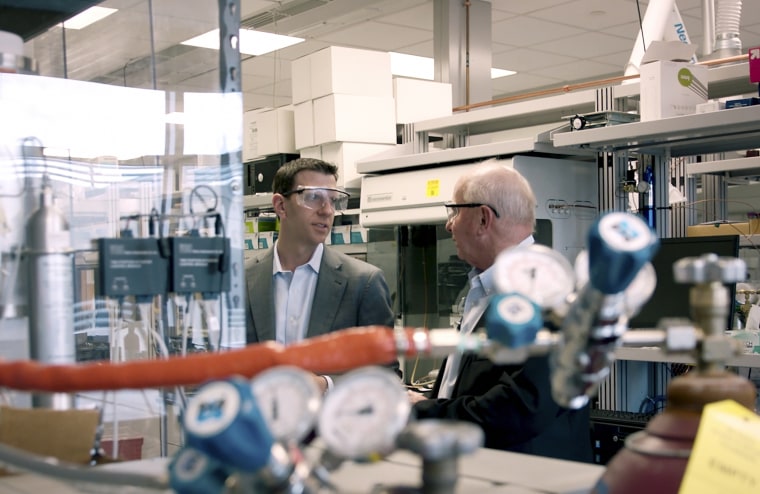Seeking to secure the nation's supply of critical medications, the Trump administration has signed a $354 million contract that would create the nation's first strategic stockpile of key ingredients needed to make medicines.
The four-year agreement was signed Monday with Phlow Corp., a generic drug maker based in Virginia. According to a news release to be made public Tuesday, the project will use federal funds from the Biomedical Advanced Research and Development Authority under the Department of Health and Human Services.
The goal is twofold: to enable the U.S. to manufacture essential drugs at risk of shortage and to create a reserve of active pharmaceutical ingredients to reduce the dependence on foreign suppliers.
Phlow's CEO, Dr. Eric Edwards, told NBC News that the company had been in discussions with the administration back in November but that the project was fast-tracked once COVID-19 hit.
"We said: 'We have a short-term and long-term solution. We know that there are certain key essential generic medicines that are going to go into shortage if this thing starts spreading,'" Edwards said. "There were drugs that were already on the FDA drug shortage list long before COVID-19 and we already saw what was happening with PPE, and we knew this was going to be as bad or even worse."
"PPE" is short for personal protective equipment used by medical personnel.
Edwards said the company is set to provide more than a dozen medications and ingredients used for sedation, pain management, blood pressure control and antibiotics. It has already produced over 1.6 million doses of five essential generic drugs used to treat COVID-19 that were added to the U.S. Strategic National Stockpile in March.
“The pandemic has created a surge in the number of hospitalized patients which may create a shortage of supplies of critical medicines,” HHS said in a statement. “The team will be able to rapidly provide U.S. health care systems with finished, sterile, injectable generic medicines at risk of shortage.”
Full coverage of the coronavirus outbreak
Phlow will be manufacturing the drugs in partnership with the nonprofit pharmaceutical company Civica Rx, Virginia Commonwealth University and AMPAC Fine Chemicals, a manufacturer of active pharmaceutical ingredients. The total value of the Phlow contract is up to $812 million, which includes the possibility of an additional $458 million to keep the project going longterm. It was first reported by The New York Times.
"This is an historic turning point in the battle of President Trump to bring our pharmaceutical manufacturing and supply chain home to American soil," White House trade adviser Peter Navarro told NBC News.
The American Society of Health-System Pharmacists called the contract a potential "game-changer."
“The use of advanced technology will allow for faster production of drugs, reduce the potential for error, and enable a nimbler approach to changing market demands such as the urgent need for medications we’ve seen during the COVID-19 pandemic,” said Tom Kraus, vice president of government relations at ASHP
But Allen Goldberg, a spokesman for the Association for Accessible Medicines, the organization that represents manufacturers of generic drugs, said they're wary of a startup’s ability to address such a longstanding issue in the industry.
“This is a systemic situation -- drug shortages, onshoring, manufacturing -- that requires a much bigger policy conversation,” he said in a statement. “American patients are served by a thoughtful, systemic approach and not any one-off contract.”
The move would help address a longstanding concern in the health care sector, experts said, as the vast majority of raw drug ingredients are produced overseas, mainly in India and China because of cheap manufacturing costs and less stringent regulations. Experts have long feared a significant supply disruption caused by the country's dependence on foreign manufacturing.
The coronavirus pandemic has forced hospitals to scramble to source critical medications for COVID-19 patients. In some cases, fear of shortages has created a competitive landscape among health care providers seeking the same medications.
Arash Dabestani, senior director of pharmacy at NYU Langone Health in New York, said getting the necessary drugs often involves a team of six people making calls to wholesalers, distributors and direct manufacturers as early as 9 a.m. And even then, they may get only half the supply they really need.
"It's like an auction," Dabestani said. "Whoever screams the loudest gets it."

Even before the coronavirus, pharmacy directors like Dabestani would consistently monitor for possible drug shortages. During the pandemic, additional drugs went into shortage, including fentanyl, an opioid pain reliever commonly used to sedate patients on ventilators.
Massachusetts General Hospital in Boston echoed a similar concern in late March for albuterol, an asthma drug being used to treat respiratory complications due to COVID-19.
But drug shortages in hospitals are nothing new. At any given time in the U.S., more than 100 drugs are in short supply. The Food and Drug Administration maintains a public database that indicates which drugs are in shortage.
But when the coronavirus hit, the need for certain drugs became more acute. The FDA has even asked manufacturers to evaluate their own supply chains, including active pharmaceutical ingredients and finished dose forms, for supply chain disruptions caused by the coronavirus, according to the agency's website.
In real time, hospitals are sometimes down to a month's or even less than a day's worth of certain drugs, according to the American Society of Health-System Pharmacists.
In the age of the coronavirus, the potential consequences of supply shortages caused by disruptions overseas have come into sharp focus as countries like India, a major pharmaceutical exporter, restrict key drug ingredients and medications.
But according to Tuesday's contract announcement, the government-Phlow partnership will introduce a new model to bring manufacturing back to the U.S.
"We believe this work can revolutionize America's generic drug manufacturing model by enabling Phlow to produce affordable ingredients used to manufacture essential medicines in the U.S.," said Dr. Frank Gupton, co-founder of Phlow, chair of Virginia Commonwealth University's Department of Chemical and Life Science Engineering, and CEO of the Medicines for All Institute.
Download the NBC News app for full coverage and alerts about the coronavirus outbreak
Edwards said Phlow will operate the nation's first strategic active pharmaceutical ingredients reserve, a supply of critical raw drug ingredients that will be stored in secure locations around the country.
"When there is a trade dispute or a natural disaster or a pandemic that creates a vulnerability in the supply of one or more drugs, as soon as we see that vulnerability begin to manifest itself, Phlow Corporation will pull that active ingredient out and we'll work with our conversion partners, such as Civica, to make the finished dosage form, then get it into the Strategic National Stockpile," Edwards said.
Phlow has declined to comment on the exact drugs and ingredients being manufactured with its partners, citing national security concerns and competition among other generic drug manufacturers.
"I cannot emphasize enough how vulnerable our supply chain is and how critical some of these drugs are in shortage," Edwards said.
In a statement Wednesday, Phlow said the federal government issued an appeal for applications in February in a process known as a "broad agency announcement." "After weeks of negotiation, we were awarded a sole-source, cost reimbursement contract," the company said.
George Washington University law professor Steven Schooner said he was surprised by the size of the contract.
”It seems like a strange use of HHS’s emergency acquisition authority to award a contract of this size for four years with an option to extend the period up to ten years," Schooner said.
In a statement released Thursday, an HHS spokesperson said Phlow "put together a very experienced team of established partners to ensure success to this endeavor."
"Each are experts in their field and provide the foundation for sound business practices and program success," the spokesperson added. "As included in the contract, all agreements and pricing will be transparent and reviewed by BARDA on a monthly basis."
The deal has refocused attention on the controversial history of Edward's former company, Kaleo, which he co-founded with his brother.
Kaleo was the subject of a U.S. Senate subcommittee investigation after it sharply raised the price of its opioid overdose antidote Evzio in the middle of the opioid crisis.
According to a 2018 report by the U.S. Senate Permanent Subcommittee on Investigations, Kaleo increased its price of the drug more than 600 percent by 2016, costing taxpayers more than $142 million over four years.
A spokesperson for Phlow said that Edwards was "never involved or allowed to be involved in pricing decisions for the company."

